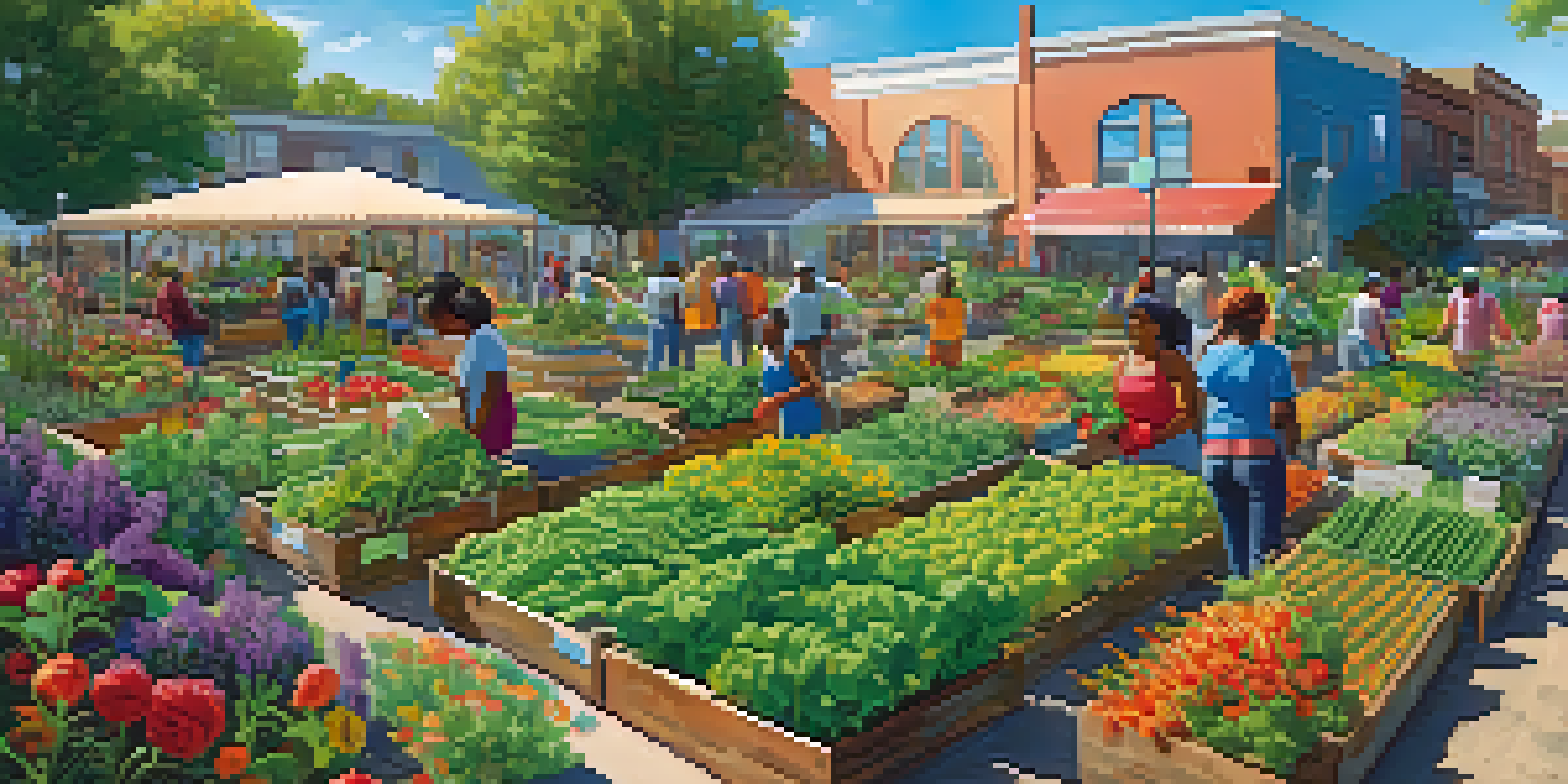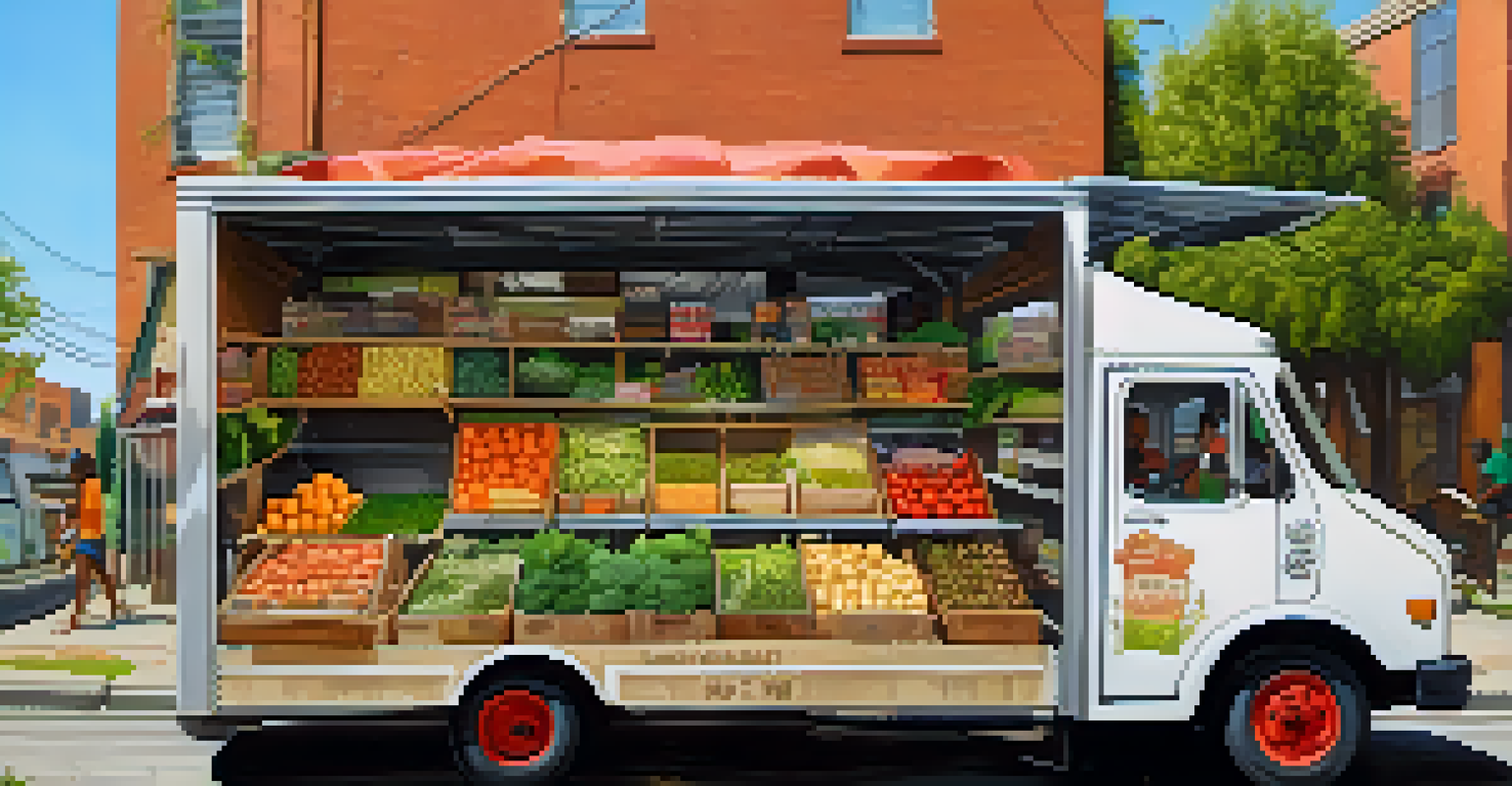Food Deserts: The Impact on Vegan Access and Equity

Understanding Food Deserts: A Brief Overview
Food deserts are areas where residents lack easy access to affordable and nutritious food. These locations often have few grocery stores, making it difficult for people to find fresh fruits, vegetables, and other healthy options. Instead, convenience stores or fast-food outlets often dominate the landscape, which can lead to unhealthy eating habits.
Food deserts are not just an issue of access; they are a matter of social justice.
The impact of food deserts is particularly pronounced in low-income communities, where residents may not have reliable transportation to travel for better food options. This geographical barrier not only limits access to nutritious food but also contributes to a cycle of poor health outcomes, such as obesity and diabetes. For those striving for a vegan lifestyle, the challenges can be even more significant.
In essence, food deserts create a landscape where healthy choices are scarce, making it difficult for individuals to make dietary changes, including adopting a vegan diet. This lack of access to fresh produce and plant-based products fundamentally affects food equity and social justice.
The Vegan Perspective: Challenges in Food Deserts
For individuals who wish to adopt a vegan lifestyle, food deserts present unique challenges. Veganism relies heavily on access to fresh produce, grains, legumes, and other plant-based foods, which are often unavailable in these areas. Without reliable access to these essentials, maintaining a vegan diet becomes not just a challenge, but an impractical goal.

Moreover, the processed vegan alternatives that are often found in convenience stores are typically more expensive and less nutritious. This can lead to a misconception that veganism is unattainable or even unhealthy for those living in food deserts. The lack of variety and quality in available food options can discourage individuals from pursuing a plant-based lifestyle altogether.
Food Deserts Limit Healthy Choices
Food deserts restrict access to affordable and nutritious food, leading to unhealthy eating habits in affected communities.
These barriers reflect broader issues of systemic inequality and highlight the urgent need for increased access to healthy food options. By understanding these challenges, we can better advocate for solutions that promote vegan access in underserved communities.
Health Implications of Limited Vegan Options
Living in a food desert can have dire health consequences, especially for those trying to pursue a vegan diet. Without access to fresh fruits and vegetables, individuals may resort to consuming processed foods that are high in calories but low in essential nutrients. This can lead to a host of health issues, including malnutrition and diet-related diseases.
The future of food is plant-based, and we must ensure that everyone has access to it, regardless of their zip code.
Additionally, the emotional and mental toll of not being able to access desired food can be significant. Feeling deprived of healthy options can lead to frustration and disillusionment, pushing people away from healthier lifestyles. When health-promoting foods are inaccessible, it creates a vicious cycle of poor health outcomes.
Ultimately, the lack of access to healthy vegan options in food deserts exacerbates existing health disparities, particularly in marginalized communities. Recognizing these implications is crucial in addressing food equity and advocating for improved access to nutritious food.
Community Initiatives: Bridging the Gap
Many communities are taking proactive steps to address the challenges posed by food deserts. Initiatives like community gardens, farmers' markets, and food co-ops are popping up in underserved areas, providing residents with access to fresh produce. These grassroots efforts not only improve food access but also foster community engagement and education around healthy eating.
Some organizations are partnering with local farms to create mobile markets that deliver fresh produce directly to food desert neighborhoods. These mobile markets often offer affordable prices and a variety of vegan options, making it easier for residents to maintain a plant-based diet. Such initiatives showcase how communities can come together to address food inequities effectively.
Veganism Faces Unique Barriers
Individuals in food deserts struggle to maintain a vegan diet due to the scarcity of fresh produce and affordable plant-based options.
By creating accessible sources of healthy food, these community-driven solutions can empower individuals to make better dietary choices. They also highlight the importance of local action in combatting the systemic issues that contribute to food deserts.
Policy Changes: Advocating for Food Equity
Addressing food deserts requires not only community initiatives but also systemic policy changes. Advocates are pushing for policies that incentivize grocery stores to open in underserved areas, providing tax breaks or subsidies to encourage healthy food retail. These changes can create a more equitable food landscape for all residents.
Moreover, policies that support urban agriculture and community gardens can further enhance access to healthy food options. By allowing residents to grow their own food, communities can foster self-sufficiency and resilience. This not only improves access to fresh produce but also educates individuals on the benefits of a vegan diet.
Ultimately, policy changes can create lasting impacts on food equity, ensuring that all individuals, regardless of their location, have access to nutritious food options. Advocacy for these changes is crucial in the fight against food deserts and the promotion of veganism.
The Role of Education in Promoting Veganism
Education plays a vital role in empowering individuals to make healthier food choices, particularly in food deserts. By providing resources and knowledge about plant-based diets, communities can help residents understand the benefits of veganism. Workshops, cooking classes, and informational campaigns can demystify vegan cooking and highlight accessible recipes.
Additionally, educating individuals about the nutritional aspects of a vegan diet can help dispel myths that it is unhealthy or too expensive. When people learn how to prepare affordable and nutritious meals using available ingredients, they are more likely to embrace a vegan lifestyle. This education can foster a sense of agency over their food choices.
Community Initiatives Foster Change
Grassroots efforts like community gardens and mobile markets are helping to improve food access and promote healthy eating in underserved areas.
By prioritizing food education, communities can not only improve access to vegan options but also promote overall health and well-being. This approach empowers residents to take control of their diets, making informed choices that can lead to a healthier lifestyle.
The Future of Vegan Access in Food Deserts
Looking ahead, the future of vegan access in food deserts depends on continued advocacy and community efforts. As awareness of food deserts grows, more individuals and organizations are likely to rally for change. This collective action can help push for policies and initiatives that prioritize equitable access to nutritious food.
Technological advancements, such as online grocery delivery services, also offer hope for improving food access. However, it's essential that these services are made affordable and accessible to residents of food deserts. Ensuring that everyone can benefit from these innovations is key to promoting food equity.

In conclusion, while challenges remain, the growing focus on food justice and community engagement presents an opportunity for positive change. By working together, we can create a future where healthy, vegan options are available to everyone, regardless of where they live.